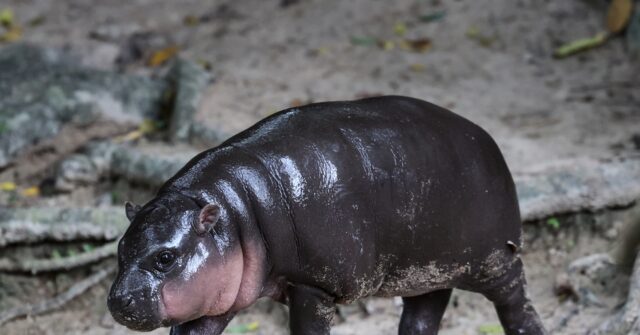In an unexpected twist in the lead-up to the U.S. presidential election, a baby hippo named Moo Deng has emerged as an unlikely prognosticator. This three-month-old pygmy hippo, residing at the Khao Khewo zoo in Thailand, has allegedly predicted that former President Donald Trump will defeat incumbent Vice President Kamala Harris, representing the Democratic Party. Moo Deng’s prediction was made during a whimsical event where the hippo was presented with two melons—one labeled with Trump’s name and the other with Harris’s. The zoo’s staff reported that the hippo eagerly chose the melon associated with Trump, which has since become a viral sensation across social media platforms, particularly among Trump supporters.
Moo Deng’s journey to prediction fame highlights the fascination with animal behavior as a form of political forecasting. Animal antics have often been embraced as amusing and light-hearted ways to engage with political events. The choice made by Moo Deng has been interpreted by many as a positive sign for Trump’s campaign, with social media users playfully announcing that “it has been decided” regarding the election outcome. Such lighthearted declarations underscore a broader trend in which supporters and enthusiasts find unique ways to underscore their political preferences, often elevating even the most unconventional indicators to prove their points.
In a continuation of the animal theme surrounding the Trump campaign, Moo Deng isn’t alone in capturing the public’s imagination. Recently, controversy surrounding the death of Peanut the Squirrel has garnered significant attention. Peanut was euthanized after authorities in New York state seized him from his owner’s apartment, an act that sparked outcry from Trump supporters who viewed it as government overreach. Memes and social commentary relating to Peanut have proliferated, showcasing how quickly animal stories can morph into political discourse, especially as they connect with the narratives surrounding particular candidates.
Adding to the peculiarities of this election cycle, the Smithsonian’s National Zoo made headlines when it announced the euthanasia of Kamala, an elderly elephant suffering from osteoarthritis. The timing of this event, coinciding with the unfolding political drama, has been interpreted by some as a sign of bad luck for Harris. While it is undoubtedly a sensitive topic involving animal welfare, the overlap of such events with the political realm cannot be understated, as they are often used to illustrate or humorously comment on the perceived fate of political figures.
The intertwining of animal events and political predictions reflects a cultural moment where the unconventional thrives. Moo Deng’s prediction serves as a reminder of the various ways individuals seek to find meaning or solace in uncertain political climates. Crafting narratives around animal behavior allows supporters to feel a sense of connection to the broader electoral process. Notably, the spectacle of claiming animal predictions can also distract from more serious political discussions, offering an amusing take on engagement with the electoral process.
While it remains to be seen how accurately Moo Deng—or any other amateur animal oracle—will predict the outcome of the 2024 election, the episode showcases how social media fuels a playful interaction with politics. Supporters find joy in connecting their charismatic animal figures to their preferred candidates, often leading to the rapid spread of stories that blend humor and political commentary. As the election approaches, the animal kingdom might continue playing an unexpected role in shaping the narrative and engaging voters, reinforcing the notion that politics, while serious, can also be downright entertaining.

